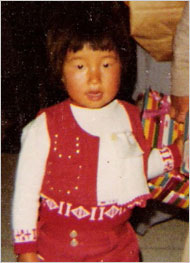 Today’s New York Times blog ran an intriguing opinion piece written by a Korean-born woman adopted by a white American family. In the essay, Hollee McGinnis aka Lee Hwa Keong, ruminates about the loses and gains of transracial and ethnic adoptions:
Today’s New York Times blog ran an intriguing opinion piece written by a Korean-born woman adopted by a white American family. In the essay, Hollee McGinnis aka Lee Hwa Keong, ruminates about the loses and gains of transracial and ethnic adoptions:
My personal awakening to the losses of adoption began in my late adolescence when I became aware that strangers assumed I was not an American because I did not have blond hair and blue eyes or assumed I spoke Korean (or Chinese or Japanese) or complimented me on my English. I, on the other hand, did not think of myself as Korean – although I felt pride that I was — because I was raised by a non-Korean family. I felt like an imposter because people assumed I knew Korean culture based on my race, but I only knew American culture.
Thus, in my first year of college I sought to fulfill the stereotypes and assumptions people had of me based on my race. I studied Mandarin – because my college did not offer Korean at that time – and took classes in Asian art and history. But it angered me that people would make assumptions about who I was based on things I could not change: my gender, my race, my adoption status – and judge me not for the individual I was. And so in my sophomore year I changed my major to American studies because I wanted to understand how I, as an Asian woman with an Irish last name and blond-haired mother, could be an American too.
Although not an adoptee…1.5 generation KA raised in the Asian mecca that is Flushing, Queens…much of what Hollee discusses resonates with me. Although I’m many years removed from those highly charged teen and 20something years when every racial comment seemed like an invitation to fight, I still get highly irritated when someone compliments my English skills or commends my seamless integration into American culture. While I recognize that I fall into the highly accultured Asian-American category (even my sisters tease me and tell me I’m “soooooo white”), I dislike it when this fact is pointed out to me. My disdain for such comments isn’t due to a rejection of either American culture or a fear of losing my Koreanness. Similar to Hollee McGinnes, it is a distaste for the practice of limiting and defining me by my race and ethnicity. I like to think that people are much more interesting then their race, gender, country of origin, or sexual orientation would dictate.
Ultimately, while Hollee McGinness’ essay is a reflection on the dynamics of transcountry adoption, her experience surfaces many of the festering complexities of race, diversity, and inclusion that remain unaddressed and unresolved in American culture. Haven’t all non-white immigrants (or children of) experienced some level of racial identify schism on the road to adulthood? And more importantly, will this sort of identify schism be less prevalent in 50 years when minorities are no longer the minority in the US?
Footnote: I don’t think the concept of an “AKA” is limited to adoptees. I’ve got one on my naturalization papers. My Korean name is my professional moniker while my western name is used strictly for restaurant reservations…I stopped spelling my name out to reservationists a long time ago. Anyone else have an aka?







